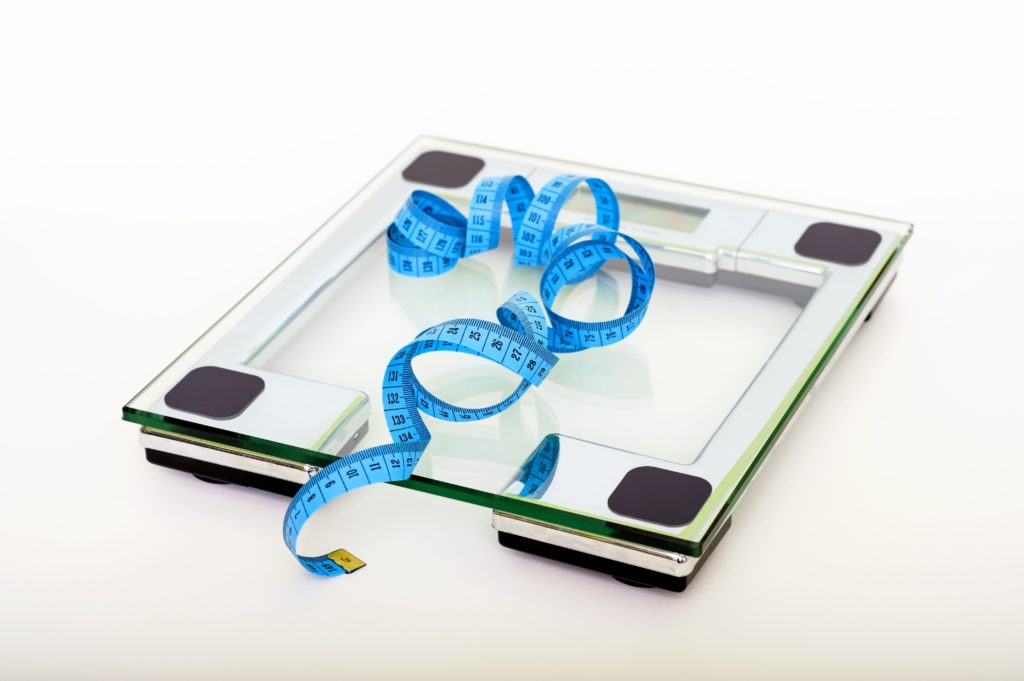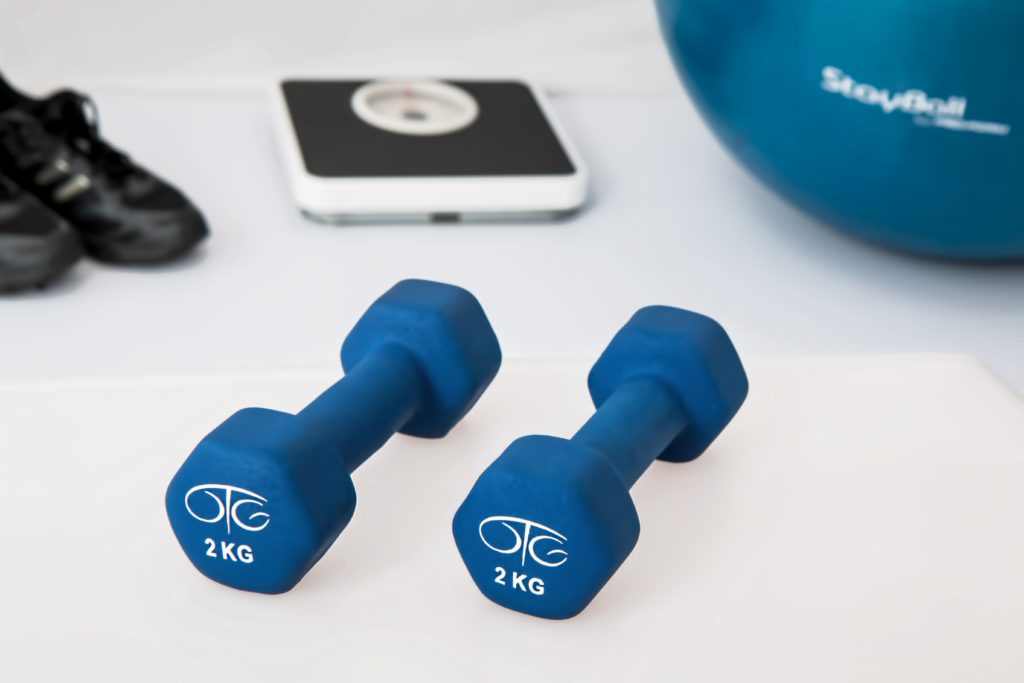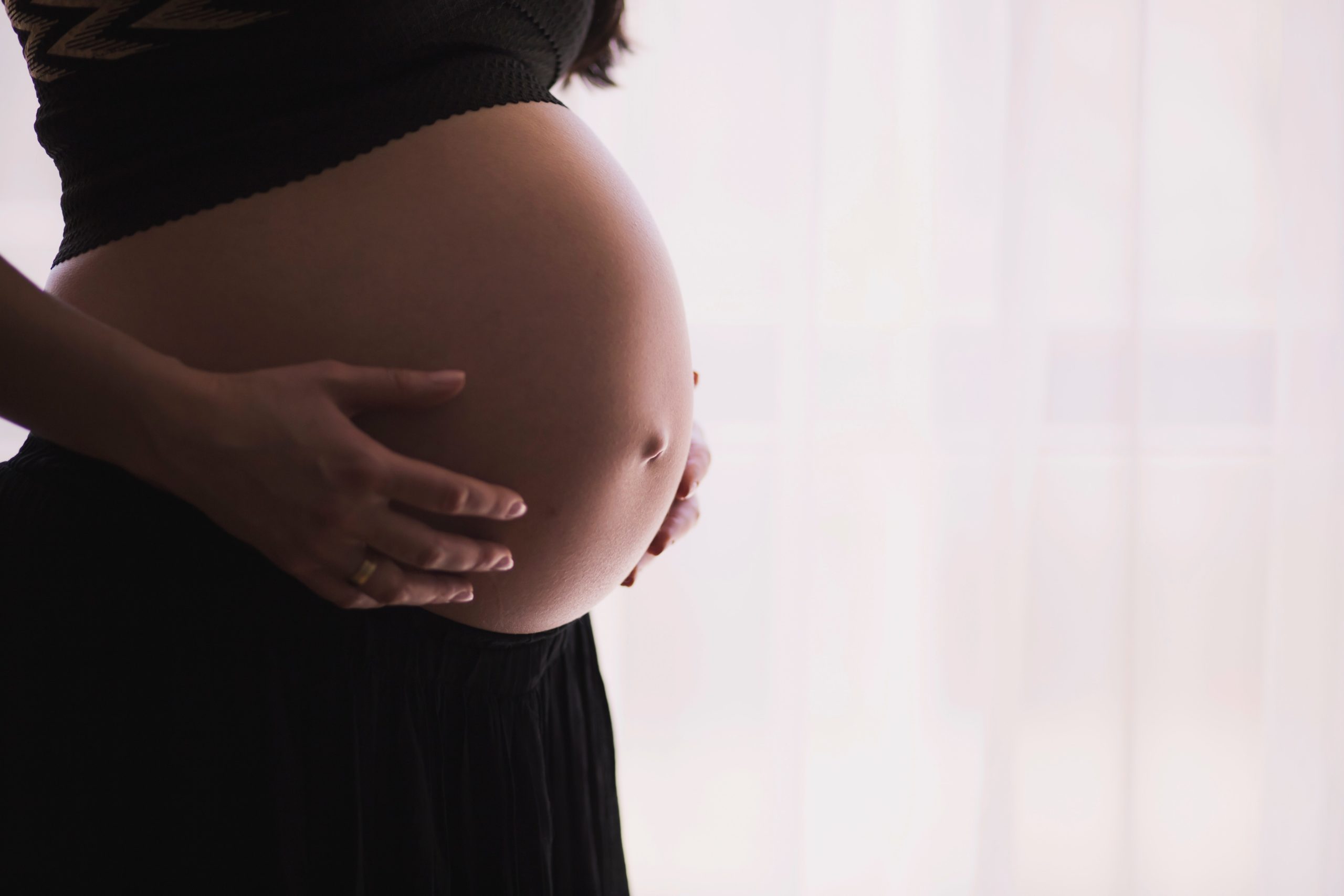“I’m going to do something I shouldn’t,” I said to my husband as I stepped on the bathroom scale.
I knew there was little to be gained (no pun intended!), except maybe some material for this blog post, but I was curious.
I was 5 weeks postpartum, surely I had lost weight since a week after having the baby, right?
Nope.
I wasn’t expecting to feel so annoyed. I thought I was just curious! I have done a lot of work on my body image and I am in a really good place with it. I know the number does not define me, and also, I fully realize I was 5 WEEKS POSTPARTUM.
But still I caught myself thinking, “I lost weight a lot more quickly last time. What’s wrong with my body?” and then was annoyed with myself for having these thoughts.

This is a time when online medical records can be helpful. A quick search revealed that even though I recalled being back to my pre-pregnancy weight at 12 weeks after having my daughter, I most certainly was not.
In fact, 4 months after having my daughter I was still significantly heavier than my pre-pregnancy weight. I had completely forgotten this. Then I apparently did not go to the doctor for a while (new year, new deductible) so I don’t know what my weight was from months 4 to 11, but I was close to my pre-pregnancy weight around 1 year postpartum.
Back then, I specifically recall taking the advice of a friend of mine, who told me that “Your body will not feel fully normal for a year.”
Turns out that was pretty good advice.
But What Does the Research Say?

Of course, I also wanted to know what the research says about postpartum weight loss. Immediately after stepping off the scale, I went to my trusty friend Google Scholar. In particular, I wanted to know:
- What is the average weight loss trajectory postpartum?
- What factors are associated with postpartum weight change?
- What can we do to make things easier on ourselves during this crazy time?
Here is what I found.
Postpartum Weight Loss
We all know those women who seem to lose weight immediately after having a baby. In high school I recall my dance teacher coming back weeks after having her baby, looking EXACTLY THE SAME. Even as a high schooler I knew this was crazy. Recently I saw a mom at a breastfeeding support group whose baby was less than 2 weeks who looked like she had never given birth.
Clearly these women are not the norm, but our brains tend to fixate on this. We rarely compare ourselves to the other women with a more typical postpartum weight loss.
Not surprising, the research supported the idea that these immediate weight loss women were the exception, not the rule, and I needed to relax and be patient.
Typical Weight Loss After Having a Baby
One study examined women who breastfed for at least 12 months, compared to women whose infants were weaned to formula by 3 months and measured the mom’s weights monthly from 1 to 18 months (Dewey, Heinig, & Nommsen, 1993). These women had pre-pregnancy weights in the average range and they gained an average of about 33-35 lbs during pregnancy (Dewey et al., 1993), with no significant differences between groups. Importantly, women intentionally dieting to lose weight were excluded; the women studied were not intentionally restricting calories (Dewey, Heinig, Nommsen, & Lonnerdal, 1991).
The groups had similar weight loss at 1 month, and the breastfeeding moms lost more weight from 3-6 months. By 1-year, the breastfeeding moms group had lost about 5 lbs more than the moms who weaned to formula by 3 months (Dewey et al., 1993).
This finding is similar to that of a larger study in Swedish women which found that in breastfeeding mothers, much of the weight loss postpartum occurs between 2.5 and 6 months (Ohlin & Rossner, 1990).
Potential Reasons for Weight Loss Delay
Researchers speculate that weight loss might increase around postpartum month 2 or 3 due to changes in the hormone prolactin. Prolactin has been shown to increase appetite (and therefore food intake), but levels tends to drop around 3 months while milk production tends to stay stable, potentially leading moms to continue to burn more calories for breastmilk production but perhaps eat less, and therefore lose weight (Dewey et al., 1993).
Weight Retention at 1-Year Postpartum
Many women are at a weight higher than their pre-pregnancy weight 1 year postpartum and beyond. One study found that 68% of women retained some weight at 1-year postpartum and the median weight retention at 1-year was about 5 lbs (Martin et al., 2014). Previous research found that the average weight retention ranged from 3.3 lbs to 8.8 lbs (Ohlin & Rossner 1990; Olson et al. 2003; Amorim Adegboye et al. 2008).
But this is the average, and there are many women who lose more or less than that. Studies with higher proportions of low income ethnic minority women tend to report higher rates of postpartum weight retention (e.g., Rothburg et al., 2011 reported that 52% of the sample retained more than 10 lbs at one year).
Factors Associated with Weight Retention

- Breastfeeding less than 3 months
- Women who report breastfeeding at 3 months and beyond tend to lose more weight at 1 year postpartum (Martin et al., 2014; Dewey et al., 1993). However, the overall effect is not huge. As stated above, the breastfeeding mothers in one study lost about 5 lbs more than the mothers who weaned to formula completely by 3 months (Dewey et al., 1993).
- Sleeping less than 7 hours per night at 5-6 months postpartum and beyond
- Sleeping less than 7 hours per night at 5 months postpartum was associated with less weight loss in one study (Herring et al., 2018). Another study found that sleeping less than 5 hours per day at 6 months and 1-year postpartum was associated with increased markers of inflammation at 3 years postpartum (Taveras et al., 2001), which could explain part of the reason weight loss is challenging among sleep deprived moms.
- Gaining extra weight during pregnancy
- Weight gain above the Institute of Medicine’s recommendations (for women starting with an average BMI, recommended weight gain is between 25-35 lbs) is associated with higher weight retention at 3 and 15 years postpartum (Nehring, Schmoll, Beyerlein, Hauner, & von Kries, 2014).
- This is particularly true for women starting pregnancy with a BMI in the obese range (Vesco et al., 2009).
- Remember that these are associations and averages, and not hard and fast rules. Just because you gain a little beyond the recommended amount, does not mean you will necessary struggle with postpartum weight loss. I know plenty of women who gained more than the recommended amount, myself included, who eventually returned to their pre-pregnancy weight.
- Less structured exercise
- Moms who report exercise during their free time that makes them “breathe hard and sweat” are less likely to retain weight (Olson et al., 2003).
Postpartum Weight Loss Interventions
Traditional Diet and Exercise Programs

What about interventions that help pregnant and postpartum moms lose weight? Do they work?
Unfortunately, results are somewhat similar if not worse than traditional weight loss interventions in the general population. That is, results are generally underwhelming.
A recent study had mothers randomly assigned to usual care or usual care plus meal replacements during pregnancy and found no significant differences in weight at 1 year postpartum (Phelan et al., 2018).
Similarly, a study that enrolled overweight or obese mothers at 6 weeks postpartum and offered 8 healthy eating classes and 6 telephone coaching calls over 9 months found no significant impact on weight loss at 1 month or 12 months (Ostbye et al., 2009).
Interestingly, one small study did find that overweight and obese women who were 3.5 months postpartum and who joined a weight loss intervention delivered via Facebook did lose an average of 4.8% of their weight after 12 weeks (Waring et al., 2018). It is possible that the group support and accountability aspect was useful here, but that is purely a guess. Additionally, this study was very small (19 women) and follow up would be needed to see if improvements in weight and health behaviors were maintained.
Intuitive Eating

In general, traditional behavioral weight loss outcomes are poor, as I have reviewed in the past and the postpartum period is likely an even harder time to focus on weight loss due to the many other demands on your time and attention.
If you read this blog regularly, you know I am a fan of intuitive eating, because I have found it personally useful and the data supports it. From the limited data we have, it seems that postpartum moms are no exception.
Intuitive eating is associated with postpartum weight loss, even when controlling for breastfeeding duration, exercise, pre-pregnancy BMI, and BMI change during pregnancy (Leahy, Berlin, Banks, & Bachman, 2017). Therefore, this approach may offer an alternative to the weighing and measuring needed for a more traditional calorie reduction diet. This seems helpful because I can barely remember when I fed my kid last in the newborn phase, let alone remembering to track my food intake.
Notably, we know less about how this might work for women in the overweight or obese range, or for women who do not already engage in intuitive eating, since this study was not an intervention study, but just an observational one (i.e., they just asked women what they did, versus teaching them a specific way to relate to food, or to eat).
7 Things You Should Know About Postpartum Weight Loss

- It takes time. For most women, weight loss will not be immediate. If you are breastfeeding, weight loss may be greater between 3-6 months. Be patient with your body. Appreciate what it is doing for you and your family. Take care of it the best you can.
- Breastfeeding may help, but don’t beat yourself up if this is not something you can, or want to do. Many studies show an association with breastfeeding and weight loss, particularly if breastfeeding is done until at least 6 months. If you are one of the many women who struggle to breastfeed though, do not beat yourself up, the link between breastfeeding and weight loss is not absolute and some women who breastfeed report difficulty with weight loss until they stop breastfeeding. Each women is individual and the last thing that will be helpful is criticizing yourself for something you cannot control.
- Avoiding excess weight gain during pregnancy may help. There is evidence that women who gain more than the recommended amount by the Institute of Medicine tend to retain more weight at 1 year, 3 years and even up to 15 years postpartum.
- Sleep matters. Doesn’t it always? Pretty much all postpartum parents are sleep deprived. Luckily, sleep deprivation is not associated with weight retention until 5-6 months postpartum. I say luckily since I’m 6 weeks postpartum now and definitely not getting 7 hours per night. Try to get as close to the 7 hours per day that you can, in chunks if need be (as it likely will be for many of us) as less than that per day is associated with postpartum weight retention.
- Moving your body helps. Spending some of your free time to exercise is important. I’d argue this is most important for mental well-being, but it is also associated with weight loss. So ask for a break, and go do your preferred physical activity.
- Stop fixating on the number on the scale, or at least be honest with yourself about whether it’s truly useful. My master’s thesis project was on weighing yourself, and it suggested that weight monitoring does not negatively impact mood in any significant way. That said, my experience of weight monitoring is that it is not hugely useful for me. Only you can decide whether weighing yourself is useful (i.e., helpful information for you) or harmful (i.e., making you angry and frustrated and critical of yourself) for you. My choice to weigh myself at 5 weeks postpartum was truly out of curiosity, but I got frustrated with what I saw. It did not have any significant long-term damage on my psychological well-being, but was not helpful. I will continue to engage in healthy habits as much as I can, regardless of what the scale says, so I will only be weighing myself at doctor’s appointments and every few months perhaps, from now on.
- Self-care, self-care, self-care. I don’t have a specific study to support this, but it is just common sense. And as a women currently in the thick of the postpartum period, I know in my gut it’s what we need to do. Prolonged, unaddressed stress is not good for anyone, particularly those looking to lose weight. Taking care of a newborn is stressful and exhausting even when you have a lot of support (which I luckily do). Take time to do what you need to do for yourself, when you can. See if you can view eating well as a form of self-care, and do so with a focus on your body’s internal hunger and fullness signals. You are likely exhausted enough, so how can you eat and drink in a way that fuels your body as much as possible, versus giving you a spike of energy and then causing you to crash a few hours later.
What has your experience been with postpartum weight?
Did your weight come off at a certain time period? Did you have to focus on it or did you feel it occurred naturally? Did you think breastfeeding played a role for you? In what way?
I’d love to hear your story, so send me a message or comment below!
References
Amorim Adegboye A., Linne Y. & Lourenco P. (2008). Diet or exercise, or both, for weight reduction in women after childbirth (Review). Cochrane Collaboration 4, 1–40.
Dewey, K. G., Heinig, M. J., & Nommsen, L. A. (1993). Maternal weight-loss patterns during prolonged lactation. The American Journal of Clinical Nutrition, 58, 162–166.
Dewey, K. G., Heinig, M. I., Nommsen, L. A., Lonnerdal, B. (1991). Maternal versus infant factors related to breast milk intake and residual milk volume: the DARLING study. Pediatrics, 87, 829-837.
Herring, S. J., Yu, D., Spaeth, A., Pien, G. Darden, N., Riis, V., Bersani, V., Wallen, J., Davey, A., & Foster, G. D. (2019). Shorter sleep duration increases postpartum weight gain. Obesity, 27, 295-303.
Leahy, K., Berlin, K. S., Banks, G. G., & Bachman, J. (2017). The relationship between intuitive eating and postpartum weight loss. Maternal and Child Health Journal, 21, 1591-1597.
Martin, J. E., Hure, A. J., Macdonald-Wicks, L., Smith, R., & Collins, C. E. (2014). Predictors of postpartum weight retention in a
prospective longitudinal study. Maternal and Child Nutrition, 10, 496–509.
Nehring, I., Schmoll, S., Beyerlein, A., Hauner, H. & von Kries, R. (2014). Gestational weight gain and long-term postpartum weight retention: a meta-analysis. The American Journal of Clinical Nutrition, 94, 1225-1231.
Ohlin A. & Rossner S. (1990) Maternal body weight development after pregnancy. International Journal of Obesity, 14, 159–173.
Olson, C. M., Strawderman, M. S., Hinton, P. S., & Person, T. A. (2003). Gestational weight gain and postpartum behaviors associated with weight change from early pregnancy to 1 year postpartum. International Journal of Obesity, 27, 117-127.
Ostbye, T., Krause, K., et al. (2009). Active Mothers Postpartum: A randomized controlled weight loss intervention trial. American Journal of Preventive Medicine, 37, 173-180.
Phelan, S., Wing, R. R., Brannen, A., McHugh, A. et al. (2019). Does partial meal replacement during pregnancy reduce 12-month postpartum weight retention? Obesity, 27, 226-236.
Taveras, E. M., Rifas-Shiman, S. L., Rich-Edwards, J. W., & Mantzoros, C. S. (2011). Maternal short sleep duration is associated with increased levels of inflammatory markers at 3 years postpartum. Metabolism, 60, 982-986.
Vesco, K. K., Dietz, P. M. et al. (2009). Excessive gestational weight gain and postpartum weight retention among obese women. Obstetrics & Gynecology, 114, 1069-1075.
Waring, M. E. et al. (2018). Feasibility and acceptability of delivering a postpartum weight loss intervention via Facebook: A pilot study. Journal of Nutrition Education and Behavior, 50, 70-74.

Thanks so much for this! I just hit 3 months and I have been really down now that I went back to work and feel I have SO much extra weight compared to last time at this stage. I had no idea weight loss picks up between 3-6 months but this helped me feel more patient.
I’m glad it was helpful! There are so many factors but it helps me to know the data. So many women are so hard on themselves and I think most of us know it isn’t helpful, but easier said than done! We can only do so much, but appreciating our body and being patient tends to help! Glad this info helped you in some small way!